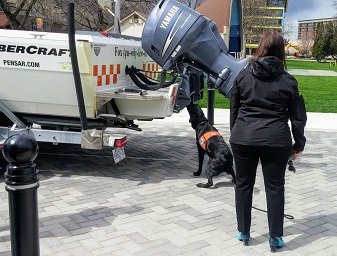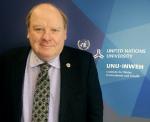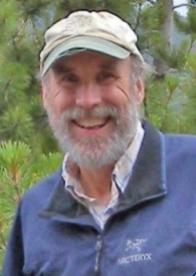Water Talk
Links to Water Conservation Tips
How to Make a Homemade Rain Barrel
2017 Rain Barrel Brochure
Outdoor Leak Brochure
Indoor Leak Brochure
Links to Videos based on the "Building Resilience in the Okanagan" Guidebook
1. Landscaping-for-Our-Semi-Arid-Climate-Webinar.mp4
2. Flood-Part-1-webinar.mp4

Invasive Mussels Will Cost Everyone. Can Dogs Save Us?
The Okanagan and Similkameen Invasive Species Society (OASISS) partnered with the RBC Blue Water Project Fund and RDOS to bring these 2 knowledgeable, experienced speakers and 2 celebrity dog to the South Okanagan in April 2017.
Cindy Sawchuck manager of Alberta’s K9 Conservation Unit demonstrated how Alberta has revolutionized their invasive mussel detection program using highly specialized dogs. Stephanie Hester from the State of Montana had the unenviable task of facilitating the response to positive detection of mussels in Tiber Reservoir and the subsequent action plans, costs and challenges Montana continues to face in an effort to mitigate their impact.
Cindy Sawchuck and Hilo: https://www.youtube.com/watch?v=CnX3dzP2w88
Stephanie Hester: https://www.youtube.com/watch?v=478H2rqGg2s
Earth Day 2017
Irrigation 101 and Beyond – presented by Carlos Pacheco of Irrigation Design Management
This PPT was part of a workshop held at West Bench Elementary school in West Bench in April 2017 – Earth Day.
The PPT describes basic technical aspects of irrigation, different systems, some common parts of an irrigation system, and where to look for potential leaks.
Irrigation is a very mathematically based and uses science and understanding this helps us to realize why it is a good rule of thumb to have a knowledgeable irrigation professional involved, at any stage, whether at the supply shop, the initial design of new system or when modifying your landscape irrigation system.
One of the workshop’s important ‘take-away’ tid-bits was learning that irrigation emitters have evolved, and the best ones to use are the many ‘PC’ rated emitters. The PC stands for Pressure Compensation, meaning the same amount of water is delivered to each plant from one end of the line to the other. A great boon for those who notice that in their system that the last sections of plant material are shorted water while the first areas receive more than they need.

2016 Managing Water - An Update Report Card - How Are We Doing?
Robert (Bob) Sandford – renowned international speaker and advisor on water issues. Bob Sandford is the EPCOR Water Security Research Chair at the United Nations University Institute for Water Environment and Health. In his work Bob is committed to translating scientific research outcomes into language decision-makers can use to craft timely and meaningful public policy.
Continuing the Conversation
Robert Sandford returns to South Okanagan to provide a Report Card on the progress made towards water supply resiliency.
There is new science, new critical issues to deal and a new normal as we must adapt to ‘climate irraticism.’ Robert’s incredibly broad knowledge of world water issues, is only matched by his keen ability to impart that knowledge in an understandable way. His strong message is tempered and brought to the local level by introductions from Dr. Anna Warwick Sears, Executive Director of the Okanagan Basin Water Board, and Don Gayton, Wetlands Coordinator for the Okanagan Basin Water Board.
2013 Managing water in the 21st Century - Are We Ready? - Video Series 2013
In November of 2013, Robert Sandford spoke to a welcoming Penticton audience of 68; made up of elected officials, water operations managers, Emergency Response personnel, BC and Federal ministry staff. The video links provided are his entire talk and the question and answer following. The day started off with an equally outstanding presentation from Soils scientist, Scott Smith from the Summerland Development and Research Station. To follow the flow of the morning, begin viewing the videos from #1 onwards.
These video are uploaded to the RDOS YouTube and can be accessed using the following links:
Video #4 14 minutes - https://www.youtube.com/watch?v=vIhBq9FnV-E
Video #5 - 16 minutes - https://www.youtube.com/watch?v=oUKUBv1SOSY
Video#6 - 18 minutes - https://www.youtube.com/watch?v=QpaOCtldk4s
Video#7 – 30 minutes – Q&A after talk - https://www.youtube.com/watch?v=G9UCaQ8bEeQ
In addition to many other books, Bob is also the author or co-author of a number of high-profile works on water including Cold Matters: The State & Fate of Canada’s Snow and Ice; Saving Lake Winnipeg; Flood Forecast: Climate Risk & Resilience in Canada; The Columbia River Treaty: A Primer; Storm Warning: Water & Climate Security in a Changing Canada and The Climate Nexus: Water, Food, Energy and Biodiversity, which he co-authored with former Deputy Minister of Environment Jon O’Riordan, all published by Rocky Mountain Books.

Scott Smith
Scott Smith – Soils Scientist
Scott Smith is a soil scientist with Agriculture and Agri-Food Canada at the Pacific Agri-Food Research Centre (PARC) in Summerland, BC. He holds a B.Sc in agriculture from McGill University and a M.Sc. in soil science from the University of Alberta. He has more than 35 years of experience in soil mapping, soil classification and land evaluation in northern and western Canada. Scott worked in terrain hazard assessment in the forest industry on the west coast earlier in his career and spent 15 years in Yukon working on permafrost-affected soils throughout the circumpolar north. He is the former head of the Federal Soil Survey with Agriculture and Agri-Food Canada and is a member of the Canadian Society of Soil Science and the BC Institute of Agrologists.
Video #1 - 17 minutes - https://www.youtube.com/watch?v=f3zzuhgeDtQ
Video #2 – 13 minutes - https://www.youtube.com/watch?v=TKB3MDZTJQg
Video #3 – 15 minutes - https://www.youtube.com/watch?v=vZzoIR2xdgM


